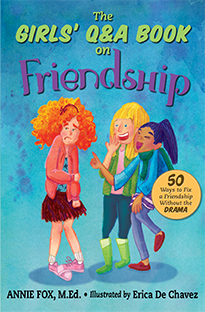 Nov. 13, 2014 “There is no girls’ friendship drama that can’t be made WORSE… through staying silent, venting behind a friend’s back, or pretending things are just peachy,” writes tweens and teens parenting pro Annie Fox in this interview that probes Annie Fox’s latest new book “The Girls Q&A Book: 50 Ways to Fix A Friendship Without the Drama.”
Nov. 13, 2014 “There is no girls’ friendship drama that can’t be made WORSE… through staying silent, venting behind a friend’s back, or pretending things are just peachy,” writes tweens and teens parenting pro Annie Fox in this interview that probes Annie Fox’s latest new book “The Girls Q&A Book: 50 Ways to Fix A Friendship Without the Drama.”
“What part of friendship gives girls the most problems?”
“A common thread weaves its way through most girl friendship conflicts and makes girls feel trapped in uncomfortable peer relationships. It’s a misconception many girls have about their role in a friendship– a bizarre assumption that: “If I speak up for myself in a friendship, I am not being a good friend.”
“Bizarre” as it may seem, it’s an insightful lens even surfacing in ADULT behavior, as I submit before you my own firsthand example of that searing truth in today’s post. Go figure.
Annie Fox’s empathetic, conversational reputation for fielding tween and teen questions with forthright candor and solutions-based style surely should have been an easy ‘safe zone’ for me to feel comfy challenging her with a branding, business style question about name generation for her newly titled “#GirlDramaChat” on Twitter. My ‘touchy question’ was really more of a simple concern…
I’m extremely mindful of word choice that can reinforce negative positioning and potentially perpetuate stereotypes of “mean girls” and “frenemies,” no matter HOW helpful and wise…so it triggered my media literacy radar to ask whether that name alone might create assumptive expectations and social norming, much like the maligned “boys will be boys.”
Could it desensitize parents of girls to the concept of relational aggression in friendships as a shoulder shrug of inevitability? Is it reductive? Aren’t we supposed to be mythbusting Mean Girl Media?
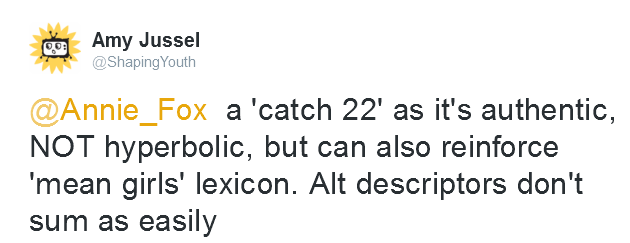 Seeing the phrase “@GirlDramaChat” pop up as a weekly occurrence seemed worthy of asking that important critical thinking question, yet there I was, queasy with that butterfly flutter of hesitance not wanting to be “misinterpreted” or disrupt a ‘girl friendship’…feeling a bit like a character in Rachel Simmons’ “Curse of the Good Girl” book.
Seeing the phrase “@GirlDramaChat” pop up as a weekly occurrence seemed worthy of asking that important critical thinking question, yet there I was, queasy with that butterfly flutter of hesitance not wanting to be “misinterpreted” or disrupt a ‘girl friendship’…feeling a bit like a character in Rachel Simmons’ “Curse of the Good Girl” book.
Should I tweet my query to Annie or take it offline? How should I pose a direct question without sounding confrontational to lead to productive discourse?
Ohfercripesakes, the irony astounds…
After reading Deborah and Annie’s dialogue (cross-posted below) the mind-numbingly obvious parallels of tiptoeing around so as not to ‘hurt feelings’ pummeled me with an “aha” teaching moment that this is EXACTLY what her new book on girls’ friendships is about.
These patterns don’t vanish ‘poof!’ in adulthood, the socialization is often engrained deep in our psyches, requiring purposeful ‘extraction’ and reframing. I finally asked Annie my question on Twitter, and though the “chicken or the egg” labeling issue remains to be seen, I love that Annie Fox addressed it with a pointblank answer:
“I chose the term because girls use it, understand it, and want less of it.
They need help!”–Annie Fox on @GirlDramaChat
Boom. Alrighty then. If it looks like a duck and quacks like a duck, no amount of Wittgenstein theory infusion will reframe the desperate need for the conversation, or change the lexicon of kid culture…So let’s get this (Twitter) party started and see where it goes. Here’s the Storify from last week to give you a flavor of common queries surfacing, as Annie fields questions and scenarios in real time Q&A for an hour.
#Girl Drama Chat Friday 11amPT on Twitter
The Girls Q&A Book on Friendship for Tweens (8-12)
 Annie Fox is working in the trenches with “tweens” and young teens, not on the academic outskirts of ‘girl culture’ or lab findings. Though parents and educators will no doubt glean preventive practices navigating the book, make no mistake, “50 Ways to Fix A Friendship Without the Drama” is written in a voice and illustrative style to appeal specifically to the 8-12 year old girls themselves.
Annie Fox is working in the trenches with “tweens” and young teens, not on the academic outskirts of ‘girl culture’ or lab findings. Though parents and educators will no doubt glean preventive practices navigating the book, make no mistake, “50 Ways to Fix A Friendship Without the Drama” is written in a voice and illustrative style to appeal specifically to the 8-12 year old girls themselves.
Her new guide is all about “fixability” when mindsets differ and things go sideways. Her format is an easy to read browse, with a ‘by and for’ girls magazine tonality.
In fact, “50 puzzling friendship questions and 50 clear answers to help you make your next best move” could easily be the front cover snipe at a checkout stand…Same with “25 Super Friend secrets from older girls, and 5 Quizzes to test your friendship skills.”
So far, she’s had an enthusiastic welcome on her parenting blog tour and in the marketplace, with a ‘just in time’ exhale among many with middle-schoolers.
Let’s face it, we can all advocate wildly for digital citizenship and prevention against prickly peer scenarios but pragmatically, kids need a “fix it now” sheet of solutions and suggestions when things go sideways.
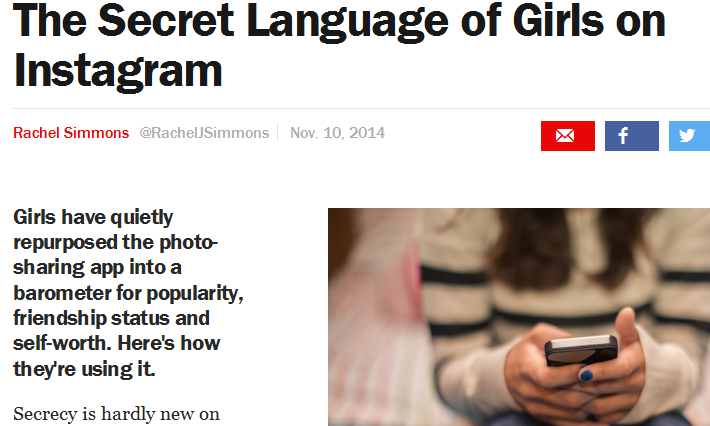 The Girls Q&A Book on Friendship addresses issues that “tweens” may not even (legitimately) be ready to deal with on sites like Instagram or Facebook (per the “under 13” COPPA rules) but for parents who ascribe to the ‘be aware’ vs ‘beware’ approach to online digital doings, it’s all the more important that this book is able to uncork these conversations earlier rather than later.
The Girls Q&A Book on Friendship addresses issues that “tweens” may not even (legitimately) be ready to deal with on sites like Instagram or Facebook (per the “under 13” COPPA rules) but for parents who ascribe to the ‘be aware’ vs ‘beware’ approach to online digital doings, it’s all the more important that this book is able to uncork these conversations earlier rather than later.
Look no further than this week’s article in Time magazine by Girls Leadership co-founder and renowned author Rachel Simmons (Odd Girl Out, Curse of the Good Girl) who wrote about “The Secret Language of Instagram.”
Simmons points to the psychological subterfuge and layers of relational aggression in very young adolescent “tween” girls using social media as both a tool and a weapon in social expression. From personal branding machines and inner circle “BFF PDA” (best friends forever/public displays of affection) the first strike antics and retaliatory measures of ‘girl culture’ have been documented well, from film to FOMO (fear of missing out) photos.
All the more reason Annie Fox is using ‘real time’ tweet chats to give parents, educators, and ‘tweens’ the tools they need to decipher, discern and apply newfound skills in ever-changing environments.
On the flipside, there are plenty of POSITIVE things girls are learning from social media that furthers kindness in relationship building too, so we need to make sure we don’t focus all on the negative without remembering the vast amounts of ‘upstanding’ and solidarity that come with using these tools too. Psychotherapist and parenting pro Katie Hurley cites this well in “4 Things Time Missed on Tweens and Instagram.”
Still, this post is about solutions-building conundrums from problematic peer encounters…Soooo…
Here are the top 5 examples of “complicated friendship” dilemmas in Annie’s new book, including the one I see most prevalently in the digital media youth world, addressing “What to do when a friend violates your privacy through social media or uses it to turn other girls against you.”
A sample of the book’s practical advice:
Q1: A girl in my class took a picture of a text I sent her and posted it on Facebook. It was about another girl in our class and now that girl hates me and is turning other girls against me. I know it wasn’t nice of me to talk behind her back but now I don’t know what to do to get them to stop. Should I ignore it or should I talk to her or all of them?
Annie Fox: It’s good that you now realize what a mistake it was to try to hurt Girl A. By texting Girl B, you added to the “social garbage” (gossip, rumors, put-downs, bullying, etc. No school needs more social garbage! You owe Girl A a sincere apology. While you’re at it, you might explain why you were feeling so unfriendly toward her. Ask her what you can do to make up for the trouble you caused. (This may an uncomfortable conversation, but sometimes, when we intentionally hurt other people, it helps us learn to do better next time if we have to experience some uncomfortable feelings).
As for Girl B (the one who took a picture of the text you sent her and posted it on FB) she also made a mistake by creating more social garbage and drama. I suggest you have a conversation with her, too. You might say something like this, “I know I shouldn’t have texted that stuff to you about Girl A, but why did you post it?” Then close your mouth and listen to what she has to say.
“…Then… close your mouth and listen to what she has to say.” I know some adults who could use this advice. Myself included.
The development of empathy is an essential life skill, and this age group is particularly ripe for social shunning and adolescent angst, so quelling conflict in the digital age takes expertise and hands-on care from trusted adults who ‘get it’ and can help lend a hand with practical advice, empathy and compassion over judgment.
As I’ve discovered over the years interviewing empathy experts in social emotional learning via their ongoing anti-bullying media work, (including Trudy Ludwig, Carrie Goldman and more) there really ARE positive, systemic changes taking place in what sometimes sounds like a media minefield, but it means laying the groundwork early and often with consistency and early childhood education.
Girls’ communication “super-sheroes” like Rosalind Wiseman and Rachel Simmons have been integral in creating cultures of dignity by giving girls the compassion and clarity early on to ‘speak up’ and speak out with ‘upstanding’ to change the culture systemically.
I’ll be joining Annie’s Twitter chat often on Fridays to get some pointers and a refresher course as I feel like I’m doing a considerable amount of “drama dodging” of my own lately, trying to sidestep online conversations that clearly are about to go haywire.
It’s as if you’re watching media messaging in slow-mo, trying to hold in possibility that it won’t accelerate into a full blown snipefest. Wronged parties have every right to call someone out, but there’s a big difference between upstanding on a principle and summoning a posse like a hit squad reminiscent of ‘girl drama’ middle school antics. Nowhere is this more disturbing than among those well-versed in the ‘girl empowerment’ field who misunderstand each other and misstep into the muck fueling a friendship quagmire that sinks everyone.
Alas, Annie Fox’s ‘girl drama chat’ may be aptly named after all…And her book may appeal far beyond tweens and teens. To echo her sentiment, I may ‘understand it’…But I want less of it and could use some help making sense of it all. If you do to, try tweavesdropping on the Twitter chat tomorrow…’See you’ Fridays 11amPT.
The Girls Q&A Book on Friendship: 50 Ways to Fix a Friendship Without the DRAMA — Excerpt
“What Part of Friendship Gives Girls the Most Problems?”
Republished with permission via Annie Fox’s blog, asked on her current Girls’ Q&A Book blog tour, by Deborah McNelis, educator and founder of Brain InSights.
Deborah McNelis: Is there an aspect of friendships that you find to be most common from girls?
Annie Fox: Yes! A common thread weaves its way through most girl friendship conflicts and makes girls feel trapped in uncomfortable peer relationships. It’s a misconception many girls have about their role in a friendship– a bizarre assumption that: “If I speak up for myself in a friendship, I am not being a good friend.” This creates huge problems for girls because when they are upset, they need to express themselves effectively and appropriately to their friend. (Talking behind her back doesn’t count as effective communication!)
Because girls are often unwilling and/or unable to initiate those necessary conversations, they feel miserable and complete stuck in their misery. They believe a “good friend” should never tell a friend something negative because then she will hurt the friend’s feelings. And that’s mean. So, if I, Annie, am hurt by something my bff Deborah did, I can not tell her, otherwise I will not be a good friend. But Deborah is not a mind reader. If I stay silent, Deborah has no way of knowing how I feel. My silence will, in fact, send the message that it is OK for her to continue treating me badly, even though it is not OK! My silence also leaves me feeling upset and powerless, not realizing that I do have power to change my response to this situation.
There is no girls’ friendship drama that can’t be made WORSE… through staying silent, venting behind a friend’s back, or pretending things are just peachy. Since we’re here to help girls make things better, one way is to give them opportunities to talk things through with us parents and teachers. Another is to do actual role play with them to boost their confidence in having these honest conversations. And finally, it’s our job to help them realize that they are never without options for feeling better about themselves in any relationship.
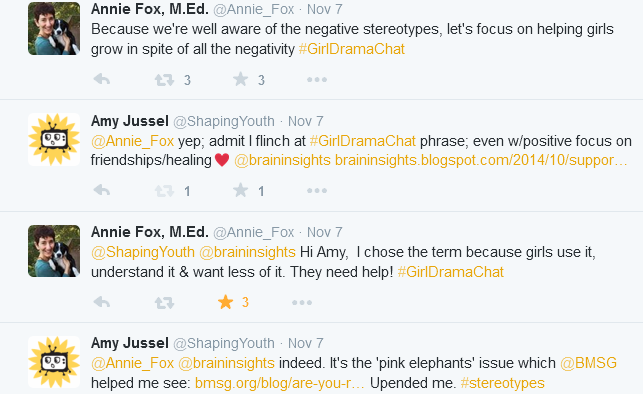
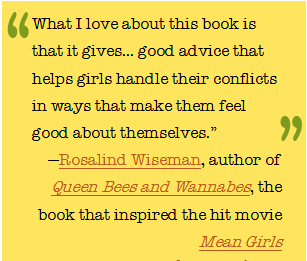









Speak Your Mind